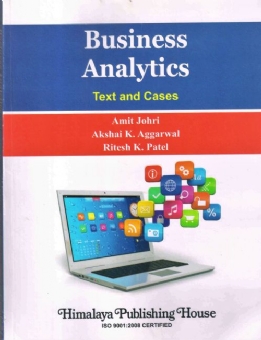Business Analytics
no information available
This book on 'Business Analytics', is one of the hottest technology topics in the world, which is a strange mix of arts, sciences and technologies. Analytics is an umbrella term referring to the processes, techonologies and techniques, which turn data into information and knowledge that drive business decisions. Using computing systems to collect, analyse and interpret large amounts of data to identify ways to help a business to improve its operations and gain a competitive edge over rivals. It requires a knowledge of Mathematics, computer Science and the ability to spot trends. With the boom in Artificial Intelligence, Machine Learning, Robotics Process Automation, a lot of companies are building out huge Business Analytics teams. Business analytics are used in industries like financial services, retail, healthcare, manufacturing, energy, oil & gas, telecom, sports, social media, gaming, e-commerce, e-governance etc. Business analytics refers to all the methods and techniques that are used by an organisation to measure performance. Business analytics are made up of statistical methods that can be applied to a specific project, process or product. It can also be used to evaluate an entire company. It is performed in order to identify weaknesses in existing processes and highlight meaningful data that will help an organisation prepare for future growth and challenges. In this book, you will learn to identify, evaluate and capture business analytic opportunities that create value. The three goals of this book are: 1. To help you think critically about data and the analysis based on those data; 2. To enable you to identify opportunities for creating value using business analytics; 3. To help you to estimate the value created using business analytics to address an opportunity. Business analytics is an integral part of modern management and this book will provide you the foundation you need to understand and apply these methods to drive value. Contents - 1. Introduction to Business Analytics 2. Types of Digital Data 3. Business Intelligence 4. Analytics in Business Support Functions 5. Application ... Read more Read less











